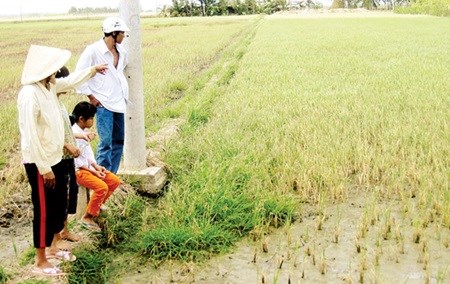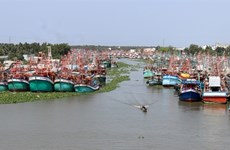Saline intrusion a threat to crops in Mekong Delta
Farmers in the Mekong Delta are facing a loss of crops as severe saline intrusion has occurred earlier than normal this year.
 Farmers in the Mekong Delta are facing a loss of crops as severe saline intrusion has occurred earlier than normal this year. (Photo: sggp.org.vn)
Farmers in the Mekong Delta are facing a loss of crops as severe saline intrusion has occurred earlier than normal this year. (Photo: sggp.org.vn)HCM City (VNA) – Farmers in the Mekong Delta are facing a loss of crops as severe saline intrusion has occurred earlier than normal this year.
The annual flooding season, which brings much-needed water to rice fields, was lower than usual, creating water shortages.
More than 600,000ha of winter-spring rice, or about 40 percent of the delta's winter-spring rice crop, will be affected by saline intrusion that will enter 60-70 km deep inland, according to the Plant Cultivation Department under the Ministry of Agriculture and Rural Development.
As of mid-January, Soc Trang province in the delta had more than 2,300ha of rice affected by saline intrusion, with 780ha of crops ruined, according to local officials.
Soc Trang has more than 100,000ha of winter-spring rice that is now flowering. The province's authorities have warned farmers to take fresh water into rice fields and keep watch over the weather forecast.
In Tien Giang province, the water level of canals and ditches is very low and declining rapidly.
Tran Hong Nhat Nam, Deputy Chairman of the Go Cong Tay district People's Committee in Tien Giang, said the district has had to pump water from larger canals into smaller canals and ditches.
Local commune officials have been told to strictly monitor canals and ditches, pump water into the canals and ditches, and take measures to prevent saline intrusion and drought.
Nguyen Thien Phap, Head of the Tien Giang province's Sub-department of Irrigation and Flood and Storm Control and Prevention, said saline intrusion had spread quickly.
In the past, the province had pumped water into rice fields that were behind schedule for planting, but this year even fields on schedule have also received water.
Tien Giang also needs irrigation water for 10,000ha of vegetables and fruits as well as daily use water for households.
By early next month, cities like Ben Tre, Rach Gia and Vi Thanh could face a water shortage for household use, the Southern Irrigation Science Institute has said.
Ben Tre city has implemented several measures to ensure water supply for households, including unprocessed water for the Son Dong Water Plant. It also has sent water tank trucks to coastal areas affected by saline intrusion and drought.
Water levels during the delta's flooding season, which typically occurs between August and November every year, and is caused by the rising levels of the Mekong River, were low.
This contributed to the shortage of fresh water and saline intrusion early this year.
The flow of the Mekong River in the delta has been 40 percent lower compared to the average of previous years, according to the An Giang province's Hydro Meteorology Forecast Centre.
In Kien Giang province, many farmers decided not to plant their 2015 autumn-winter rice crop because they wanted to allow flood water into their fields to destroy rice pests and provide soil nutrients.
However, there was not enough flood water and the farmers had to clean their fields by pumping water into them.
Van Luu Ninh, Director of An Giang province's Hydro Meteorology Forecast Centre, said El Nino had been a major reason for the lack of rainfall.
Because of the water shortage, dams in the upstream section of the Mekong River have been keeping water longer, leading to lower levels of water in downstream areas.
In recent years, the delta made plans to switch from growing rice to other high-value crops in areas not suitable for rice. However, most irrigation systems in the delta are designed for rice and not for other cash crops, experts have said.
Most farmers have not switched to other crops because of the lack of agricultural machines, farming technologies and outlet networks.
During the last flooding season between August and November, the delta had a poor harvest of fish and other aquatic species, which usually appear in larger numbers during the flooding.
Nguyen Van Lac, a fisherman at Tra Su fishing port in An Giang province, said many fishermen had to leave the area during flooding season because of a lack of fish.
Many farmers who make a living by catching fish in the flooding season have gone to work in other provinces.
Duong Van Le, Deputy Head of An Phuoc hamlet in the district, said members of 26 households in the hamlet were working in other areas.
Dr. Le Anh Tuan of the Can Tho University's Climate Change Research Institute, said the scarcity of fish in the flooding season would continue to increase in direct proportion to the construction of dams in the upstream section of the Mekong River.
Tran Anh Thu, Director of the An Giang province's Department of Agriculture and Rural Development, said the delta should restructure crop cultivation, build regulating reservoirs and restore cajeput forests to ensure sufficient water supply to households and farms.-VNA













